Jodi Picoult Writes About What She Doesn’t Know—But Is Willing to Learn
September 21, 2018 | Filed in: Woman of the Week
To call Jodi Picoult an author is to sell her a bit short. She has written 24 novels in 26 years—25 if you count her next book, A Spark of Light, which comes out this October—and the last ten have debuted at #1 on The New York Times bestseller list. Known for taking on hot-button topics (gay rights, school shootings, race relations) and weaving them between multiple storylines, Picoult scrupulously researches every angle of these issues before diving in, even when it means interviewing people she adamantly disagrees with. Here, she discusses her latest work, which examines modern-day reproductive rights, as well as why she can’t stand being called a “writer of women’s fiction.”
WHEN I WAS FIRST LEARNING HOW TO WRITE, I was told, “Write what you know,” and it took me zero time to realize I knew absolutely nothing. I grew up in suburbia. I have two happy, healthy, married, in-love parents, and a little brother whom I like. I didn’t seem to have anywhere near the amount of trauma necessary to write about my experiences. So instead of writing what I knew, I decided to write what I was willing to learn. That opened up the world to me.
I WROTE A SPARK OF LIGHT BECAUSE I’d been thinking about how, when I was in college, I had a friend who got pregnant, and after many tearful conversations, she decided to get an abortion. I supported her a thousand percent, and I’ve always considered myself to be pro-choice. Then, fast forward almost 20 years later, I was pregnant with my third child—exactly as pregnant as my friend had been—when I had a complication. I went to the doctor and a radiologist said to me, “Well, it’s either going to stick or it’s not.” I was horrified, because at that point it was already a baby to me. That experience made me wonder how I could hold both of those ideas in my head at once.
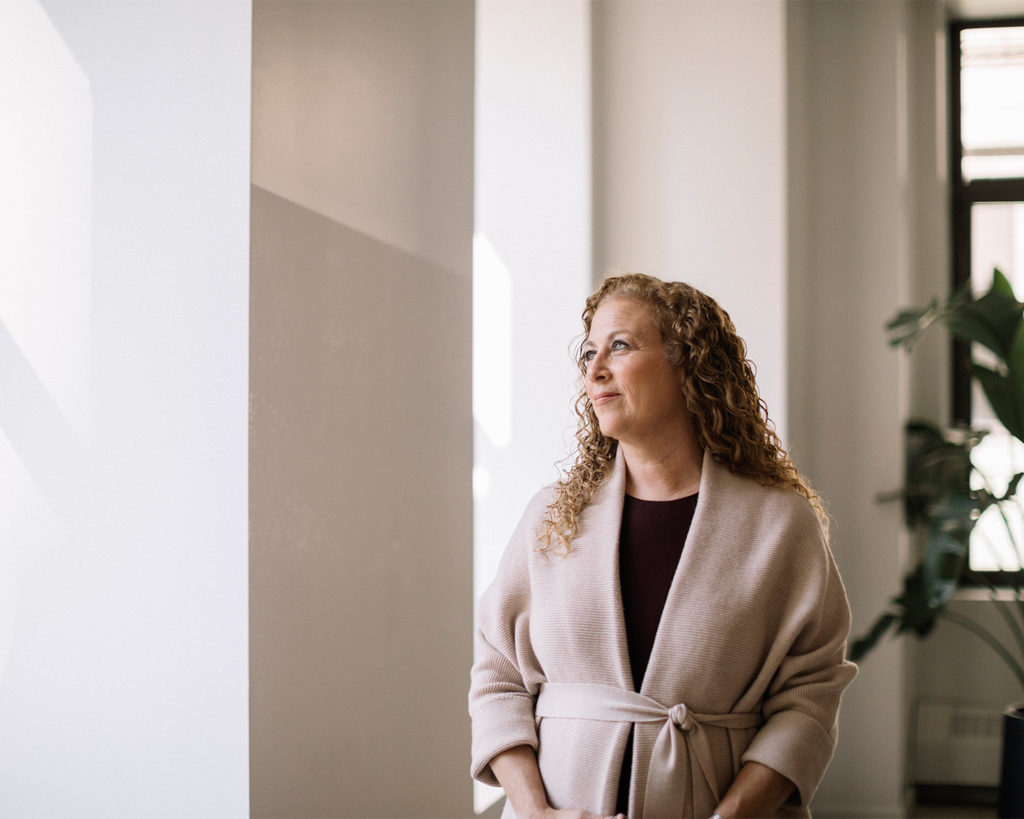
Jodi wears the Toi dress, and the Morandi sweater.
THE LINE WE TEND TO DRAW WITH REPRODUCTIVE RIGHTS isn’t just dependent on whether we define ourselves as pro-life or pro-choice. It can change for one woman over the course of her lifetime. What you believe at 14 is not necessarily what you believe at 30 or 42. That’s why abortion rights are such a contentious issue, and also why we have to be very suspicious of legalizing it, because laws are black and white but women are a hundred shades of gray. That’s what made me want to write this book right now, as we are still embattled legally, fighting for our reproductive rights.
TO WRITE THIS BOOK, I SPOKE WITH A NUMBER OF PRO-LIFE PEOPLE as well as many women who’d had abortions. I admit that when I went to talk to the pro-life people, I had a bias and assumed they were crazy zealots, and they were not. They were lovely people who just have this very deep conviction that a life begins at conception. I pushed a little and asked, “Well, what would you do if your 14-year-old daughter found herself pregnant?” And this dad said to me, “Well, I would hope she would talk to our pastor, and I’d hope she would make the right choice.” I said, “That’s a really interesting word that you’re using.”
THERE IS ALWAYS THE QUESTION, “AM I THE RIGHT PERSON to tell this story?” I think about that a lot. It came up most viscerally when I was writing Small Great Things, which is about racism and has a black character as one of the narrators. I firmly believe that cultural appropriation is real, and I completely understand why writers of color get upset when white people tell stories that they feel are not theirs. I get it. It goes beyond the fact that white writers haven’t lived that experience, and it comes down to the fact that, sadly, in our country, if you have two books about the same topic and one is by a white writer and one is by a black writer, the white writer’s book is going to get more shelf space. So as a white writer, you’re literally taking away a voice that should be on that bookshelf.
BEFORE I WROTE SMALL GREAT THINGS, I had not acknowledged all the privileges that I had as a white person. I never had to. That in itself is racism, and I had never really talked about racism before. Now, honestly, I talk about it so often that my family’s like, “Stop.” This is a country where being white gives you power and privilege, and if you do not acknowledge that some of the good fortune you have received is because of the color of your skin in America, then you’re lying to yourself. It took me 50 years to figure that out, but now that I know, I can’t un-see it. And I’m going to do my damnedest to make sure that I do my part to undo the systemic and institutional racism in this country. It’s okay to be late to the game as long as you get there.
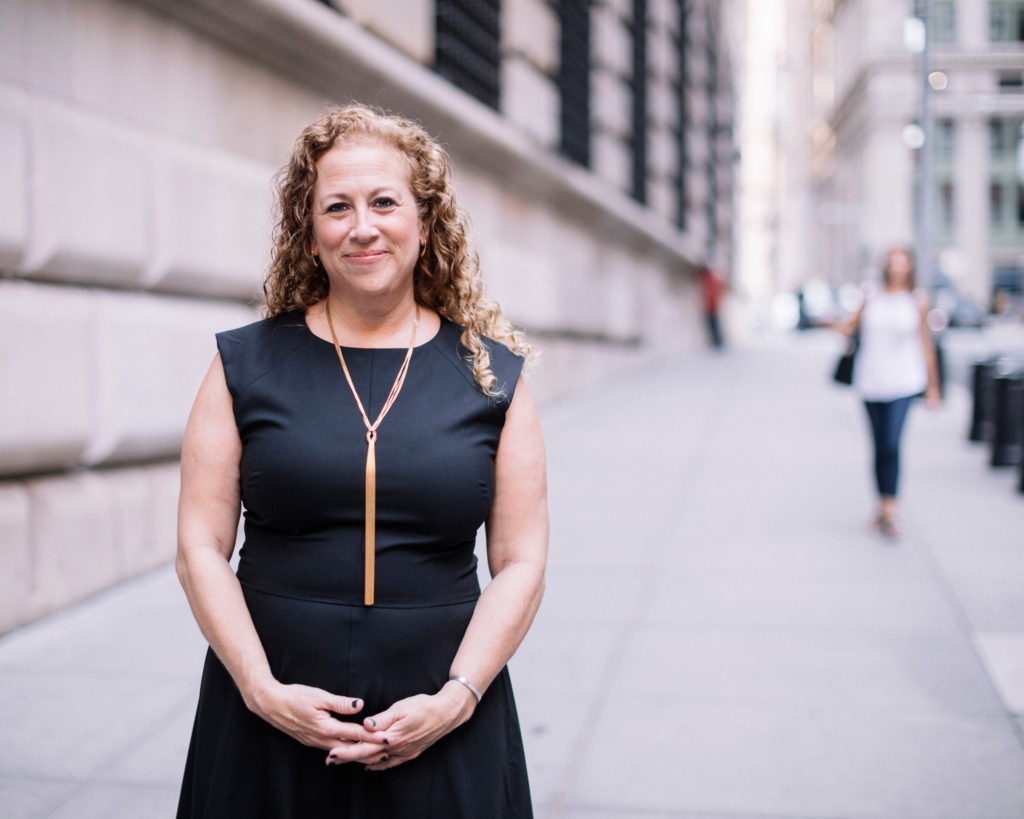
Jodi wears the Toi dress, the Kalpana necklace, and the Phoebe earrings.
ONE OF MY MOST DIFFICULT research experiences happened when I was working on Sing You Home, which is a book about gay rights. My own son had just come out to me, which was really not a big deal in our family. I would have loved him no matter what his sexual orientation was. But I went and interviewed the Family Research Council, an extremely conservative group. I asked if they were worried about whether their rhetoric might inspire homophobic violence. This woman said, “Thank goodness that hasn’t happened.” I looked at her and I said, “You know about Matthew Shepard?” And she said, “Who?” I had to excuse myself, go to the bathroom, and splash water on my face, because I got so overheated so fast. I had to remind myself, “I need to hear her point of view.” That was hard.
IT IS NOT MY JOB, AS A WRITER, TO TELL YOU WHAT TO THINK. It is my job as a writer to show you all sides of a conversation and to let you think about why you believe what you do. You may not change your mind reading my books, but you’re probably going to gain a much stronger sense of your beliefs, and maybe you’ve been rattled a little. It’s not a bad thing to read a book and feel uncomfortable. If I make a reader feel uncomfortable, it’s not because I’m trying to alienate them; it’s because I’m doing my job to challenge them. When you read one of my books, the promise I make to you is I will show you all sides of a situation. And because of that, no matter what side of an issue you’re on, you will see yourself represented. But you may also see the other side for the first time.
I START EVERY BOOK WITH A “WHAT IF?” QUESTION: “What if this happened? What would I do in that situation?” And then I begin to walk around in that space in my head a little bit. Before I start the research phase, I already know who my characters are, and I usually know the twist at the end. Then I ask myself, “What do I need to know to write this book?” And I go off and do months of research. I come back and start writing when I have the first line. When I know the first line of the book, I know I’m ready.
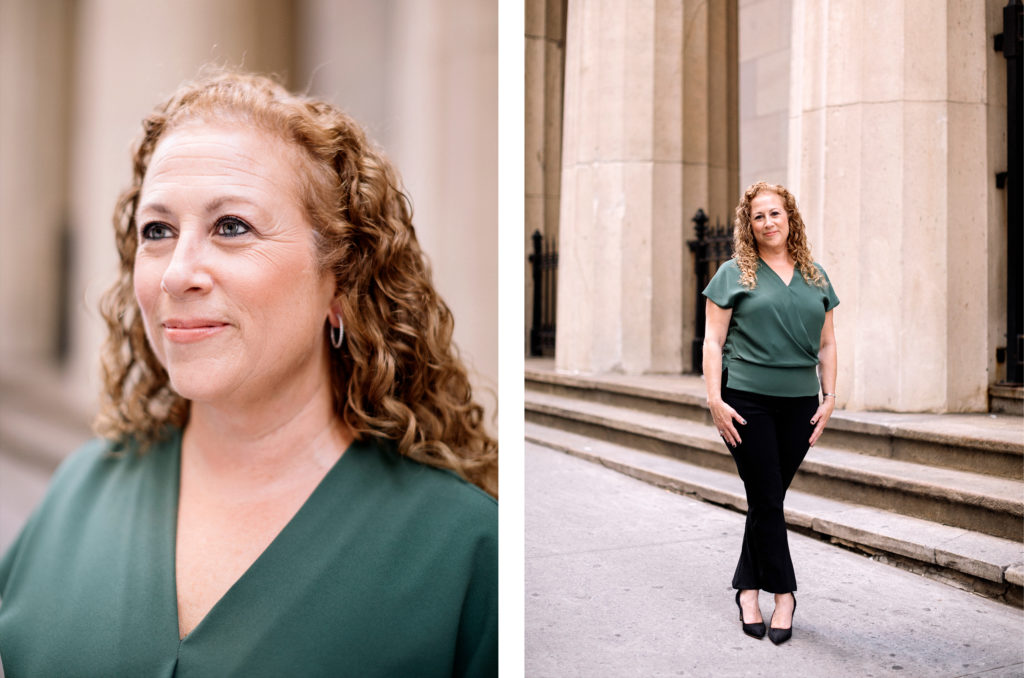
Jodi wears the Antonia top, the Oshima pant, and the Pave hoops.
AS A WRITER, YOU CARRY YOUR OFFICE BETWEEN YOUR EARS. So to some extent, no matter where you are, whatever you’re creating is playing around in the back of your mind. Sometimes, when I’m driving a long distance, I’ll suddenly have some knot in a plot unravel and I’ll realize what I have to do. I always carry Sharpies with me, and while I’m driving I will literally write up my arm so that I don’t forget it, because I know I won’t misplace my arm. Then, when I get near a computer, I’ll write it down.
WHEN I STARTED MY CAREER, I had three kids under the age of three and I was the primary caretaker. I would write when Barney and Friends was on TV, when the kids were napping, anytime they weren’t hitting each other with blocks. I would carry my laptop to the nursery school pick-up and sit there typing on top of my steering wheel. I brought my laptop to swim practice. Once my kids were in school full time, life was dramatically easier, because I had a built-in workday. But that taught me something really important, which is that writer’s block is for people who have too much time on their hands. When you don’t have time, you just write. You can always edit a bad page, but you can’t edit a blank page. So even now, when I have way more time on my hands and none of my kids are under my feet, I still treat it like a job. It’s a job I love, but it’s a job, and some days are harder than others. If I sit down and I write garbage, the next day I will edit that garbage.
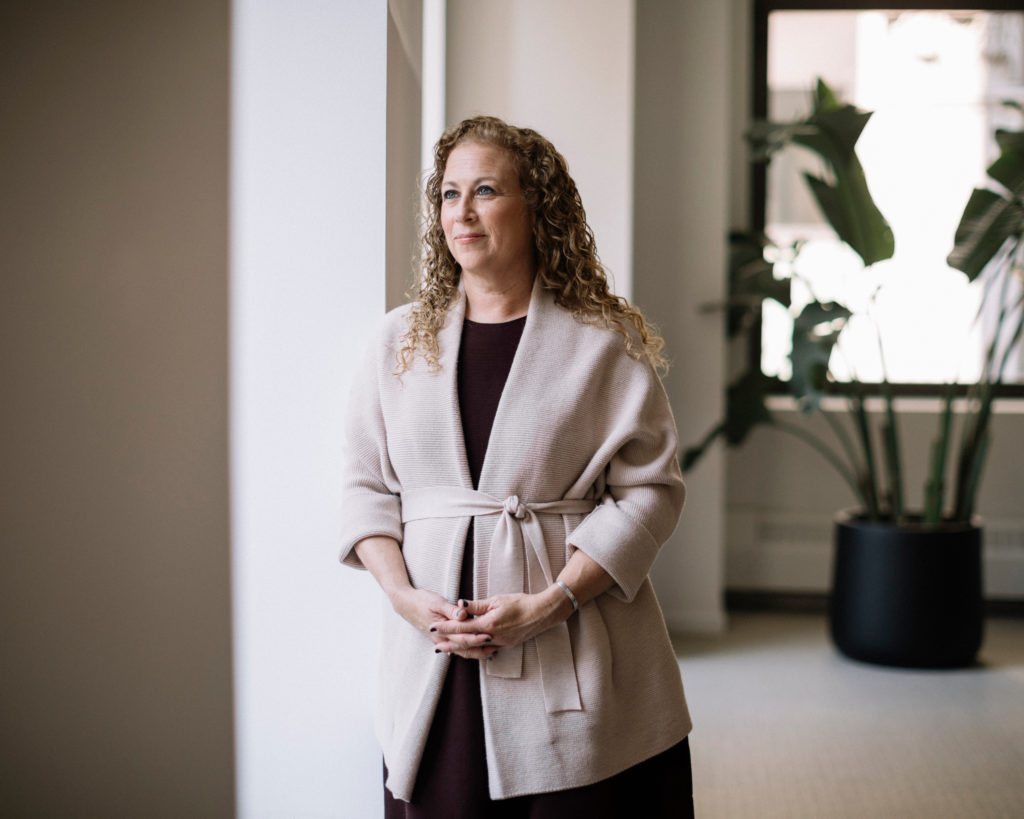
Jodi wears the Toi dress, and the Morandi sweater.
THE FIRST TIME I HAD A STORY WORKSHOPPED in my creative writing class at Princeton, my teacher Mary Morris said, “I want you to sit on the floor.” She gave me scissors and a glue stick and construction paper, and she told me to cut and paste my story based on what my classmates said. She asked, “Where does Jodi’s story really start?” Someone said, “Around page four.” She said, “Yes, that’s right,” and took the first three pages and threw them over her shoulder. I was just shocked. I walked out of there in tears, and the next day, I went to her office hours and said, “Why did you do that to me?” And she said, “Because you need it and because you can take it.” I kept editing that story, and finally she said, “You need to send this somewhere,” which shocked me. She told me to send it to Seventeen magazine, and I did. A few months after, I got an answering machine message saying, “We would like to pay you for your short story,” which was amazing, because frankly, I would have paid someone to read it.
AFTER MY FIRST STORY WAS PUBLISHED, I called my mom up and I said, “I’m going to be a writer.” And she said, “That is so great. Who’s going to support you?” My mom is my biggest cheerleader, but that was a great reality check, because most writers do not make a living wage and have to teach or have another job. It took years before I was really contributing to my family’s income.
THE FIRST TIME I MADE THE NEW YORK TIMES BESTSELLER list was a big moment. I was on a book tour, wandering through a mall in Chicago because I had nothing to do for an hour. My editor called to tell me, and I just sat there on a bench with a really stupid smile on my face for about 15 minutes. And every time it happens, I still feel that way. You don’t get sick of it, ever.
THERE IS A TENDENCY TO LABEL A FEMALE WRITER AS “a writer of women’s fiction.” But there is very little in my writing that I find gendered. I completely support the genres that would traditionally be considered women’s fiction, like romance, but I just don’t happen to write them. So it really pisses me off when someone is lazy enough to describe me as a women’s fiction writer, especially because half of my fan mail comes from men—literally 50 percent. I actually tracked it for six months because I got so tired of being called a women’s fiction writer. No one calls someone a “men’s fiction writer,” right? All the men who write to me start off by saying, “I’m sure I’m the only guy who reads your work.” We expect women to read both male and female authors, but for some reason, men don’t read female authors as often—probably because we’re called “women’s fiction writers.” I would like to believe that no matter what your gender orientation is, you can find something in my writing.
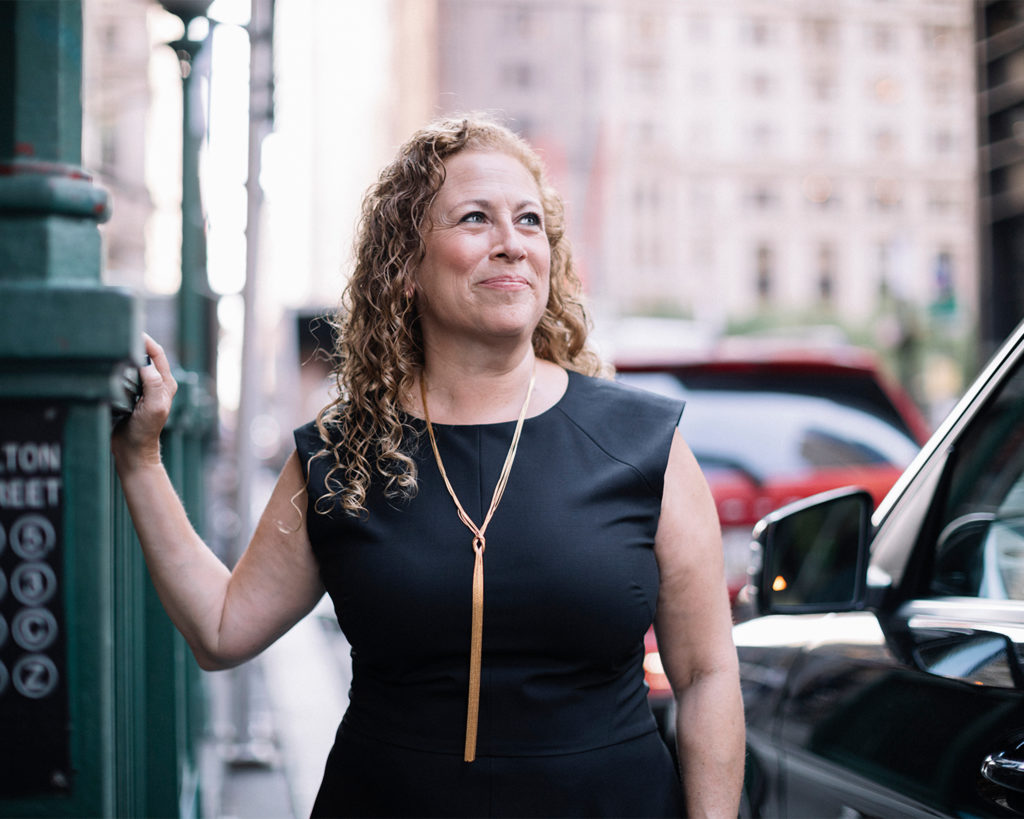
Jodi wears the Toi dress and the Kalpana necklace.
TO ME, ONE OF THE GREAT PRIVILEGES of having success is that I get to amplify the voices of others. I remember being a really new writer and getting a blurb from Ann Hood, whom I idolized. She sent me a note that said, “I wasn’t going to have time to read your book, but then I was moving houses and it was the only thing that wasn’t packed up. So I read it, and I loved it.” It was so generous to me and it made my life. It really, really did. And I wanted to pay that forward. I think if you are at a podium and you have the microphone and everyone is waiting for you to speak, sometimes the coolest thing you can do is tap that microphone and then introduce somebody else to speak, someone whose voice hasn’t been heard.
ONE THING I FIND REALLY AMUSING is that when people meet me on book tours, they tend to say, “Oh my gosh. I didn’t expect you to be so funny.” I think it’s because I write about dark things and complicated issues that make people assume I am very grave. When I’m on book tours, I try to really be me. I look a little better than I do in my regular life, but otherwise, I’m exactly the same.
I REALLY VALUE THE PEOPLE IN MY LIFE who like me just because I’m me and not because I’m a published author. When you have a degree of fame, people treat you differently. They expect you to be difficult or demanding, or they become obsequious. But my husband married me when I was nobody. He had no idea that we were going to get to go on this crazy ride together. At one point in our lives, he wound up staying home with our kids, which was a very necessary decision to allow me to take my career to the next level. There aren’t a lot of guys who would have done that. He didn’t sign on for Jodi Picoult, the writer. He just fell in love with a girl.
Photographs by Rich Gilligan.





